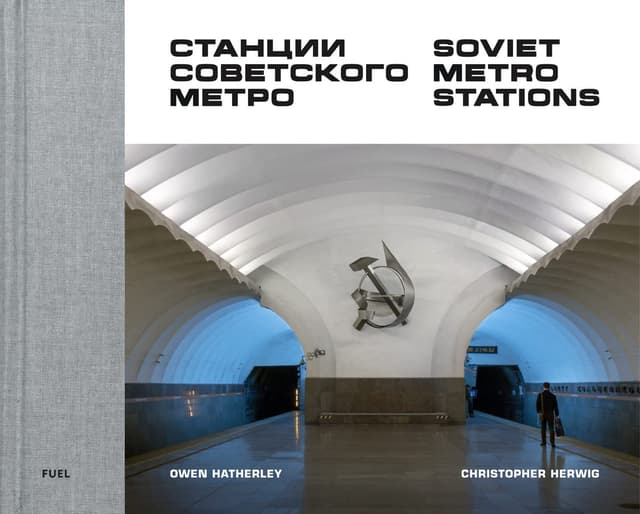Colin Nagy | October 1, 2019
Why is this interesting? - The Soft Power Edition
On Africa, investments, and Russia’s soft power games
Recommended Products

A book exploring the grandeur and architectural marvels of Soviet Metro stations, extending beyond the well-known Moscow Metro to other systems across the Soviet states.
Colin here. China has had a long and constant presence throughout Africa. It has been building infrastructure, deploying labor, extracting minerals, and amassing political power for decades. According to McKinsey, there are 10,000 Chinese businesses on the continent.
But it wasn’t just about long-term investing. As the author Patrick French noted in his book, China’s Second Continent, it was also finding new pastures as a result of the “crushing pressures—lack of space, merciless business competition, pollution—of modern Chinese society.”
China’s role in Africa is appearing to shift in strategy. According to the Economist, “China is changing the terms of its engagement, increasingly cashing in economic connections for political and military ties—again with others, such as Turkey and Russia, looking to do the same.”
But there’s another player that has been operating on the continent, often in some of the most volatile places. Russia, with several Putin-backed loyalists, has been active in the Central African Republic, as well as Zimbabwe, Guinea, and Madagascar. The Economist notes that they are playing a harder type of ball:
Russia’s moves are more muscular, and more mercenary. Often the key figures are cronies of Mr Putin, like Yevgeny Prigozhin, a former chef, rather than official state employees. Mr Vines likens them to Cecil Rhodes and other 19th-century imperialists who would lead private invasions with the implicit protection of the government back home. Last year, after the Central African Republic (CAR) asked for help fighting rebels, Russia barged aside France, the CAR’s former colonial ruler, quickly sending arms and advisers. Experts in extractive industry soon followed. The defence ministry is now home to a group of Russian “advisers”.
There’s plenty of reasons for Russia to be interested: Geopolitical blocking of adversaries, mining rights, relationship building, and oligarch enrichment to name a few. There also appears to be a desire to act under the cloak of secrecy. Three Russian journalists were killed last year under suspicious circumstances while looking into the country’s ties to diamond and gold mining. Their killers have not been found. But the lack of media coverage or oversight in their area of operations provides plenty of cover for Russia to do what it wants without consequence.
Why is this interesting?
None of this should be surprising. But what I was struck by is how Russia is starting to play their own long-game strategies and deploying soft power and not just a heavy fist and mercenaries. One doesn’t generally associate Russia with being a soft diplomacy, community-building, player. But in this case they appear to be taking a slightly different tack, even sponsoring a beauty pageant—Miss Central African Republic—brought to you by the good people at Lobaye Invest, a Russian diamond company.
According to a Times deep dive on Russia in Africa:
Other soft-power tactics have helped the Russians build, and potentially profit from, deepening ties. Billboards sprouted around the capital, Bangui, with pictures of local soldiers under a Russian flag. A mining company linked to Mr. Prigozhin has built hospitals and slaughterhouses, sponsored a soccer tournament and held a “Miss Centrafrique” beauty contest. It created a Russian-focused radio station, with a broadcast range that reached farther than state radio. It even made a propaganda-style cartoon for children, with a powerful Russian bear racing through a wintry forest, charging across the globe and coming to the rescue of its embattled friends in the African nation.
So as the US has taken their eye off of Africa with no real discernable policy aside from some terrorist whack-a-mole, Russia has become opportunistic, throwing money around, building alliances, and opening up new business opportunities. And judging by some of these soft power investments, they don’t see this as a Black Land Rover at midnight/steel briefcase smash-and-grab, but rather something that will warrant longer-term investments and time. (CJN)
Photo of the Day:
A metro station in St Petersburg from the new book Soviet Metro Stations. Via a write up from The Calvert Journal: “Anyone who knows a bit about Soviet state socialism knows about the Moscow Metro and its system of underground palaces; these awesome, opulent spaces have been a fixture of travel guides since the 1930s, and now they’re equally prevalent on Instagram accounts. Much less known is that these marble-clad portals in the centre of the capital are just the most visible elements of a gigantic Metro-building project that would gradually expand into more than a dozen different systems across several Republics — Russia, Ukraine, Belarus, Georgia, Armenia, Azerbaijan, Uzbekistan. After Moscow came St Petersburg, Kyiv, Tbilisi, Baku, Kharkiv, Tashkent, Yerevan, Minsk, Nizhny Novgorod, Samara, Novosibirsk, Yekaterinburg, Dnipro.” (NRB)

Quick Links:
I took the Anna Wintour MasterClass so you don’t have to (CJN)
A week without my wallet (CJN)
Useful for those who want to delete social from their phones but want to dip in from time to time. How to use Instagram on your Mac desktop via BP (CJN)
Thanks for reading,
Noah (NRB) & Colin (CJN)
Why is this interesting? is a daily email from Noah Brier & Colin Nagy (and friends!) about interesting things. If you’ve enjoyed this edition, please consider forwarding it to a friend. If you’re reading it for the first time, consider subscribing (it’s free!).